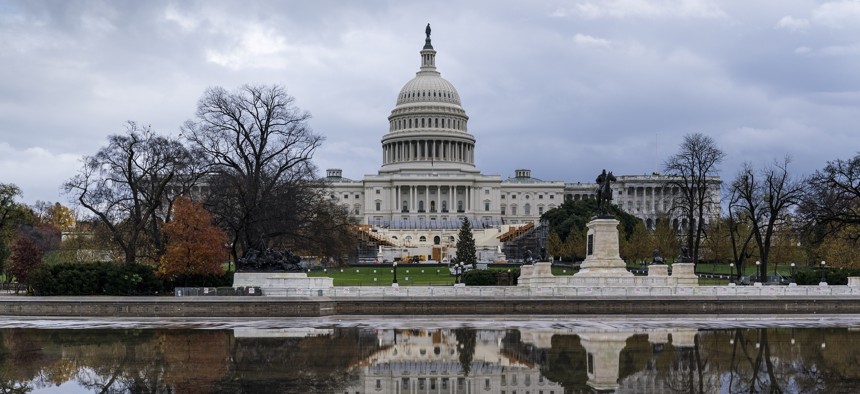Lawmakers Propose $908 Billion Covid Relief Plan in Bid to End Gridlock

The Capitol is seen in Washington, Monday, Nov. 30, 2020. AP Photo/J. Scott Applewhite
A bipartisan group of senators and House members discussed their proposal Tuesday, but congressional leaders suggested they would be moving ahead with their own plans.
A bipartisan coalition of congressional lawmakers on Tuesday introduced a $908 billion coronavirus aid proposal—jumpstarting attempts by numerous lawmakers to renew stalled negotiations in order to pass emergency relief legislation before the holidays.
The top spending priorities in the bipartisan proposal include $288 billion to renew the Paycheck Protection Program for businesses, $180 billion to give unemployed people a $300 per week boost to their benefits for four months, and $160 billion in aid for state and local governments.
Congressional leaders, whose own negotiating efforts have not generated bipartisan support, were skeptical of the proposal, instead indicating they intend to renew their own efforts to broker a deal.
House Democrats shared their own revised plan with Senate Republicans on Monday night, but declined to discuss details. Meanwhile, Senate Majority Leader Mitch McConnell said he is focused on working with the White House to include the must-have initiatives that President Trump would require to support any legislation.
Negotiations among congressional leaders and the Trump administration over a relief proposal stalled out before the election and no progress has since been made. Senators from both parties said their proposal can serve as a template for breaking that gridlock and providing essential aid as the number of Covid-19 cases surges over the winter months.
Lawmakers have not finalized the text of the legislation and neither House Speaker Nancy Pelosi nor Senate Majority Leader Mitch McConnell have provided any assurances on holding a vote, said Sen. Joe Manchin, a West Virginia Democrat who was among the lawmakers who worked on the framework. But the proposal, which is backed by at least 50 lawmakers, includes priorities and compromises from both Republicans and Democrats.
“This is the only group that has come together in such a large gathering,” Manchin said. “We are determined not to go home until we do something.”
Lawmakers said the proposal would allow the federal government to extend emergency funding through March as the economy faces further strain.
“We simply can’t leave town and leave anyone in the cold without getting something done immediately,” said Rep. Josh Gottheimer, a New Jersey Democrat who worked with senators on the proposal. “This four-month emergency relief package will help get us through the winter and into a new administration.”

The proposal also includes $25 billion in rental housing assistance, $45 billion for transit and other transportation areas, like airlines, $35 billion for health care providers, $26 billion for food programs, $16 billion for vaccine development, and $10 billion for broadband. It also includes short-term federal liability protection for businesses, schools and hospitals that would protect them against coronavirus-related litigation—a must-have item for McConnell.
The idea of providing short-term federal protection is to allow states to adopt their own liability protections in the interim, said Sen. Mitt Romney, a Utah Republican.
Prior negotiations over a relief proposal stalled out before the election, with Democrat and Republican lawmakers and the Trump administration unable to come to an agreement over funding levels and priorities. House Democrats passed a $3 trillion relief proposal earlier this year, but Republicans have sought a smaller, more targeted package.
The $908 billion plan would use $560 billion in unspent funding that was repurposed from the CARES Act, said Romney, meaning new appropriations would amount to about $348 billion under the plan.
McConnell has previously said that passing another coronavirus stimulus package before the end of the year would be his top priority and he proposed that Congress repurpose $455 billion of unspent CARES Act funding toward new legislation.
Pelosi and Treasury Secretary Steven Mnuchin spoke Tuesday about a path forward on a compromise package and Mnuchin said he would review both the $908 billion framework proposal, as well as the new House proposal. McConnell, however, said Tuesday there was little time for negotiations and suggested that targeted coronavirus relief could be attached to a spending bill that Congress must pass this month to avert a government shutdown.
Mnuchin, who testified before the Senate Banking Committee on Tuesday, encouraged congressional leaders to pass an aid package as soon as possible.
“We will continue to work with Congress to try to get something done quickly,” he said.
Andrea Noble is a staff correspondent with Route Fifty.
NEXT STORY: Governors Announce Small Business Aid Alongside Restrictions





